

Custody of Minor Child – Habeas Corpus Maintainability – The Supreme Court ruled that a Habeas Corpus petition seeking custody of a minor child is maintainable when the custody by non-guardians is without legal authority. The natural guardian, the father, was denied custody of his child, who had been staying with his maternal grandparents after his mother’s demise.
Welfare of the Child – Paramount Consideration – The Court emphasized that the child’s best interests must guide custody decisions. Despite the father’s remarriage, the Court found him financially and emotionally capable of providing for his son. The child had lived with his parents for ten years before his mother’s death, and there was no evidence of neglect or abuse by the father.
Grandparents’ Financial Constraint – The grandparents sought maintenance for the child, indicating their financial difficulties. The father, an Administrative Service Officer, had secured assets for the child’s welfare, including property, a ₹10 lakh deposit, and a ₹25 lakh life insurance policy.
Interim Arrangement Until Academic Year Completion – Recognizing the child’s ongoing academic year, the Court allowed the child to stay with his grandparents until April 30, 2025, with weekend visitation rights granted to the father. Full custody was ordered to be transferred to the father on May 1, 2025, under police supervision, with periodic visitation rights granted to the grandparents.
Custody of Minor – Habeas Corpus – Natural Guardian – Welfare of Child – Visitation Rights – Financial Security – Grandparents’ Care
The father of a minor child challenged the High Court’s decision that denied him custody of his child, who was living with his maternal grandparents after the mother’s death.
The father, an Administrative Service Officer, sought custody of his son through a Habeas Corpus petition, claiming his legal right as the natural guardian.
The High Court ruled in favor of the grandparents, citing the child's comfort and the father’s remarriage. The father contended that:
a) Whether a Habeas Corpus petition is maintainable for child custody?
b) Whether the father’s remarriage should be a factor in denying custody?
c) Whether the child’s welfare is better served under the father or grandparents?
Father (Appellant):
Grandparents (Respondents):
The Supreme Court ruled in favor of the father, stating:
Citation: 2025 LawText (SC) (2) 49
Case Number: CRIMINAL APPEAL NO._____________ OF 2025 (@Special Leave Petition (Criminal) No.14809/2024)
Date of Decision: 2025-02-07
Case Title: VIVEK KUMAR CHATURVEDI & ANR. VERSUS STATE OF U.P. & ORS.
Before Judge: [B.R. GAVAI J. , K. VINOD CHANDRAN J.]
Appellant: VIVEK KUMAR CHATURVEDI & ANR.
Respondent: STATE OF U.P. & ORS.